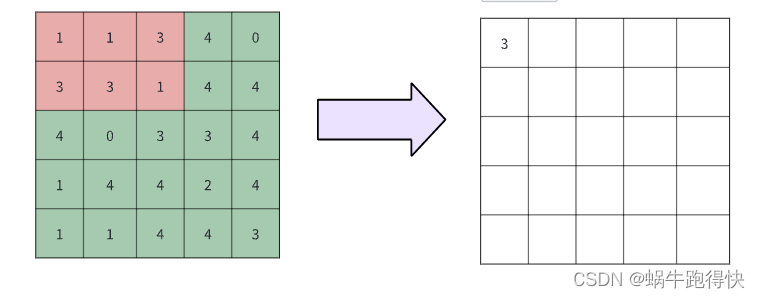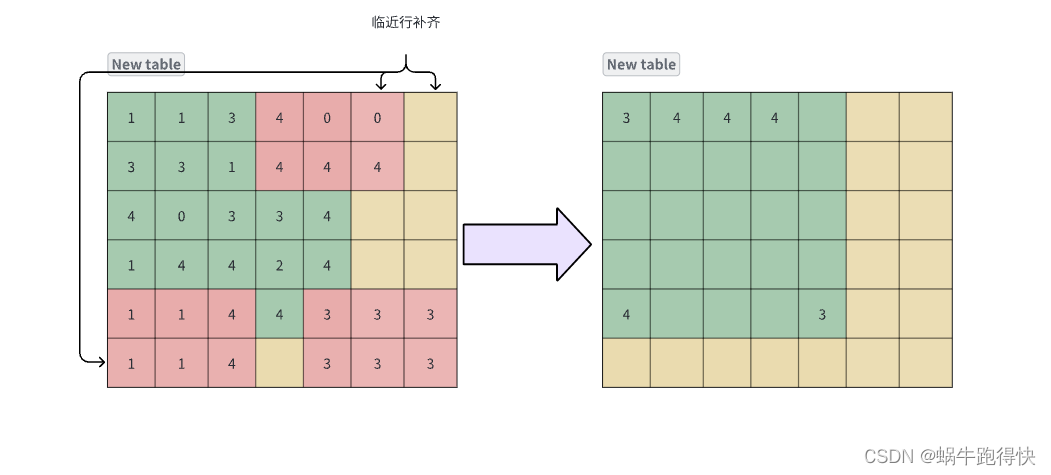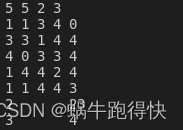题目描述
题目链接
m*n
的窗口在
M*N
的二维数组中滑动,以左上角为原点,进行窗口滑动,边缘以临近行进行补齐(repeat),滑动步伐
k=1
,得到每次滑动的最大值,将滑动窗口输出值做直方图统计且排序,分别输出
直方图
的X和Y值。
输入描述:
m(行)*n(列)的滑动窗口(m<=5, n<=5)
M(行)*N(列)的原始矩阵(M<=1000, N<=1000),矩阵中值小于256。滑动步伐k=1。

输入顺序描述:
M N m n
M*N矩阵
输出描述:
Y:直方图统计纵坐标
排序输出X:直方图统计横坐标
基于X(从小到大)顺序打印输出X和Y值
样例输入:
5 5 2 3
1 1 3 4 0
3 3 1 4 4
4 0 3 3 4
1 4 4 2 4
1 1 4 4 3
样例输出:
2 23
3 4
思路:
参考
LeetCode.239
滑动窗口找最大值,按行列分别遍历求滑动窗口最大值,先按行找滑动窗口大小为n的最大值,并将原数组覆盖(新开一个大小相同的也行);然后按列找滑动窗口最大值,覆盖原数组;遍历完毕后的数组就是所求的结果数组,最后统计结果就OK了。注意的是最后n – 1列和最后m – 1行是特例,相当于求最后几个元素的最大值。

代码
#include <bits/stdc++.h>
using namespace std;
//测试输出
void print(vector<vector<int>> &arr){
for(auto&i:arr){
for(auto&j:i){
cout<<j<<"\t";
}
cout<<endl;
}
}
void find2DMax(vector<vector<int>> &arr,int m,int n){
int M = arr.size();
int N = arr[0].size();
priority_queue<pair<int,int>>pq;
//每一行滑动窗口最大值
for (auto &i : arr)
{
while(!pq.empty())pq.pop();
for(int j = 0; j < n;++j){
pq.push({i[j],j});
}
i[0] = pq.top().first;
for(int j = n; j < N;++j){
pq.push({i[j],j});
while(!pq.empty() && pq.top().second <= j - n)
{
pq.pop();
}
i[j - n + 1] =pq.top().first;
}
//每行倒数n列赋值,是用最后一行补齐
for(int j = N - n + 1; j < N;++j){
i[j] = *max_element(i.begin()+j,i.end());
}
}
unordered_map<int,int> hash;//计数
//每一列滑动窗口最大值
for (int i = 0; i < N;++i)
{
while(!pq.empty())pq.pop();
for(int j = 0; j < m;++j){
pq.push({arr[j][i],j});
}
arr[0][i] = pq.top().first;
hash[arr[0][i]]++;
for(int j = m; j < M;++j){
pq.push({arr[j][i],j});
while(!pq.empty() && pq.top().second <= j - m)
{
pq.pop();
}
arr[j - m + 1][i] =pq.top().first;
hash[arr[j - m + 1][i]]++;
}
//每列倒数m行赋值
//保存最后几个元素方便求最值。
vector<int>temp;
for(int j = M - m + 1; j < M;++j){temp.push_back(arr[j][i]);}
for(int j = M - m + 1; j < M;++j){
arr[j][i] = *max_element(temp.begin()+j - (M - m + 1),temp.end());
hash[arr[j][i]]++;
}
}
vector<pair<int,int>> res;
for(auto &h:hash){
res.push_back(h);
}
//按X从小到大排序
sort(res.begin(),res.end(),[](pair<int,int>&a,pair<int,int>&b)->bool{return a.first<b.first;});
for(auto &r:res){
cout<<r.second<<"\t";
}
cout<<endl;
for(auto &r:res){
cout<<r.first<<"\t";
}
cout<<endl;
}
int main() {
int m , n,M,N;
//输入数据行列
cin>>M>>N>>m>>n;
vector<vector<int>> arr;
cin>>m>>n;
cout<<"请输入数据";
while(M--){
vector<int> rol;
int num = N;
while(num--){
int a;
cin>>a;
rol.push_back(a);
}
arr.push_back(rol);
}
find2DMax(arr,m,n);
return 0;
}
输出结果

版权声明:本文为weixin_51562253原创文章,遵循 CC 4.0 BY-SA 版权协议,转载请附上原文出处链接和本声明。